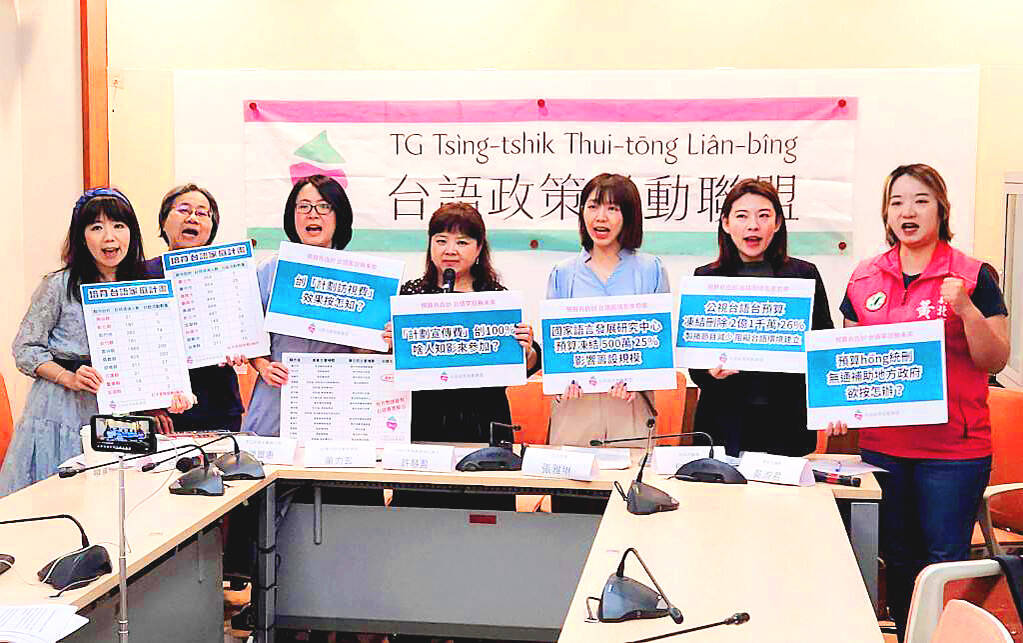Language rights advocates on Wednesday said that the government should provide resources to rejuvenate “Taigi” (Hoklo, better known as Taiwanese).
The Ministry of Culture must do more to promote Hoklo, the mother tongue of many in the nation, on top of launching a national plan last year to encourage people to speak it more at home, mother tongue preservation groups said at a news conference at the legislature in Taipei.
Chinese Nationalist Party (KMT) and Taiwan People’s Party legislators have slashed the budget for Public Television System (PTS), which handles the PTS Taigi Station, Taiwan Citizen Participation Association member Hsu Hui-ying (許慧盈) said.

Photo: Hsieh Chun-lin, Taipei Times
The opposition parties also cut the NT$2.85 million (US$87,143) budget earmarked for the ministry’s Hoklo at-home speaking plan, Hsu said, adding that other local governments have neither initiated projects nor set up dedicated agencies to implement the national plan.
Taiwan Taigi Loo Association board member Tang Lek-hian (董力玄) said the first phase of the ministry’s plan had very little participation at local levels from November last year to March.
More than half of local governments — including Taipei, New Taipei City, Keelung, Taoyuan, Hsinchu County, Nantou County, Hualien County and Changhua County — had no supervising agency, Tang added.
Li Kang Khioh Taiwanese Cultural and Educational Foundation director Chen Feng-hui (陳豐慧) said Hoklo should be treated as equally important to Hakka and indigenous languages, but Hoklo has no dedicated supervisory agency at most local governments.
Meanwhile, Hakka has the Council of Hakka Affairs, which has started language projects at many local jurisdictions since 2008.
“We call on all Taiwanese to safeguard language programs, pay more attention to them at the legislature and protect those budget items,” said Chuang Chia-ying (莊佳穎), a professor of Taiwanese literature.
Democratic Progressive Party Legislator Ngalim Tiunn (張雅琳) said that slashing the funds of language programs and the ministry’s initiatives severely harmed the linguistic rights of many people.
Hoklo is in decline, as Mandarin continues to dominate the government, media and most society sectors, Ngalim added.

The manufacture of the remaining 28 M1A2T Abrams tanks Taiwan purchased from the US has recently been completed, and they are expected to be delivered within the next one to two months, a source said yesterday. The Ministry of National Defense is arranging cargo ships to transport the tanks to Taiwan as soon as possible, said the source, who is familiar with the matter. The estimated arrival time ranges from late this month to early next month, the source said. The 28 Abrams tanks make up the third and final batch of a total of 108 tanks, valued at about NT$40.5 billion

Two Taiwanese prosecutors were questioned by Chinese security personnel at their hotel during a trip to China’s Henan Province this month, the Mainland Affairs Council (MAC) said yesterday. The officers had personal information on the prosecutors, including “when they were assigned to their posts, their work locations and job titles,” MAC Deputy Minister and spokesman Liang Wen-chieh (梁文傑) said. On top of asking about their agencies and positions, the officers also questioned the prosecutors about the Cross-Strait Joint Crime-Fighting and Judicial Mutual Assistance Agreement, a pact that serves as the framework for Taiwan-China cooperation on combating crime and providing judicial assistance, Liang

A group from the Taiwanese Designers in Australia association yesterday represented Taiwan at the Midsumma Pride March in Melbourne. The march, held in the St. Kilda suburb, is the city’s largest LGBTQIA+ parade and the flagship event of the annual Midsumma Festival. It attracted more than 45,000 spectators who supported the 400 groups and 10,000 marchers that participated this year, the association said. Taiwanese Designers said they organized a team to march for Taiwan this year, joining politicians, government agencies, professionals and community organizations in showing support for LGBTQIA+ people and diverse communities. As the first country in Asia to legalize same-sex

MOTIVES QUESTIONED The PLA considers Xi’s policies toward Taiwan to be driven by personal considerations rather than military assessment, the Epoch Times reports Chinese President Xi Jinping’s (習近平) latest purge of the Chinese People’s Liberation Army (PLA) leadership might have been prompted by the military’s opposition to plans of invading Taiwan, the Epoch Times said. The Chinese military opposes waging war against Taiwan by a large consensus, putting it at odds with Xi’s vision, the Falun Gong-affiliated daily said in a report on Thursday, citing anonymous sources with insight into the PLA’s inner workings. The opposition is not the opinion of a few generals, but a widely shared view among the PLA cadre, the Epoch Times cited them as saying. “Chinese forces know full well that